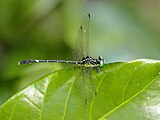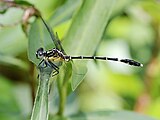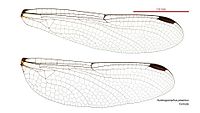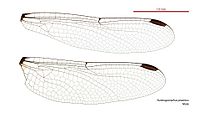Austrogomphus prasinus
Appearance
| Lemon-tipped hunter | |
|---|---|

| |
| Cairns, Queensland | |
| Scientific classification | |
| Domain: | Eukaryota |
| Kingdom: | Animalia |
| Phylum: | Arthropoda |
| Class: | Insecta |
| Order: | Odonata |
| Infraorder: | Anisoptera |
| Family: | Gomphidae |
| Genus: | Austrogomphus |
| Subgenus: | Pleiogomphus |
| Species: | A. prasinus
|
| Binomial name | |
| Austrogomphus prasinus | |

| |
Austrogomphus prasinus, also known as Austrogomphus (Pleiogomphus) prasinus, is a species of dragonfly of the family Gomphidae,[3] commonly known as the lemon-tipped hunter.[4] It inhabits streams and rivers in northern Queensland, Australia.[5][6]
Austrogomphus prasinus is a medium-sized, black and yellow dragonfly.[4]
Gallery
[edit]-
Male, Cairns
-
Male, Cairns
-
Male, side on
-
Female wings
-
Male wings
See also
[edit]References
[edit]Wikimedia Commons has media related to Austrogomphus prasinus.
- ^ Dow, R.A. (2017). "Austrogomphus prasinus". IUCN Red List of Threatened Species. 2017: e.T14277483A59256718. doi:10.2305/IUCN.UK.2017-1.RLTS.T14277483A59256718.en. Retrieved 20 November 2021.
- ^ Tillyard, R.J. (1906). "Descriptions of three new species of Austrogomphus (Neuroptera: Odonata)". Proceedings of the Linnean Society of New South Wales. 30: 547–554 [552]. doi:10.5962/bhl.part.12916 – via Biodiversity Heritage Library.
- ^ "Species Austrogomphus (Pleiogomphus) prasinus Tillyard, 1906". Australian Faunal Directory. Australian Biological Resources Study. 2012. Retrieved 13 February 2017.
- ^ a b Theischinger, Günther; Hawking, John (2006). The Complete Field Guide to Dragonflies of Australia. Collingwood, Victoria, Australia: CSIRO Publishing. p. 174. ISBN 978-0-64309-073-6.
- ^ Theischinger, Gunther; Endersby, Ian (2009). Identification Guide to the Australian Odonata. Department of Environment, Climate Change and Water NSW. p. 204. ISBN 978-1-74232-475-3.
- ^ Watson, J.A.L.; Theischinger, G.; Abbey, H.M. (1991). The Australian Dragonflies: A Guide to the Identification, Distributions and Habitats of Australian Odonata. Melbourne: CSIRO. p. 278. ISBN 0643051368.






